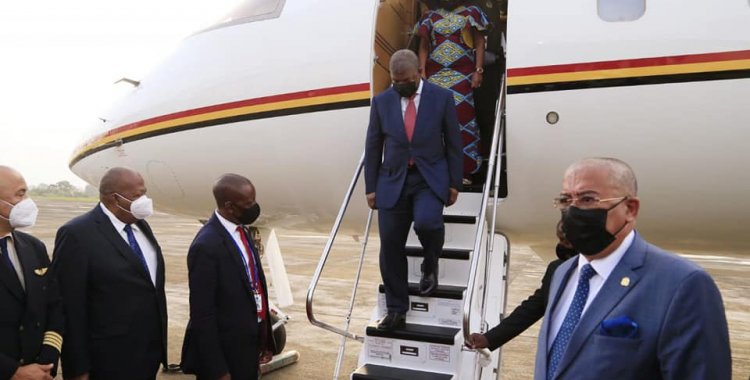The forecast that points to the physical presence of about 20 heads of state - including the Presidents of Angola, Cape Verde, Guinea-Bissau and São Tomé and Príncipe - and the host country of the two events, which take place at a time in which the AU estimates that around 113 million Africans are in need of emergency humanitarian assistance in 2022.
The spread of "terrorism" carried out by Islamic extremist groups across the continent, and two years marked by five coups d'état, four of which were recognized as such by the pan-African organization - which suspended Mali, Sudan, Burkina Faso and Guinea Conakry – provide the context for the second summit.
Preparations for the two events began last Wednesday in the capital of Equatorial Guinea, with an opening ceremony for a session of the AU executive council and a speech by the chairman of its commission, Chadian diplomat Moussa Faki Mahamat.
"Some 113 million people are in need of humanitarian aid in Africa, 48 million of whom are refugees, asylum seekers and internally displaced persons," said Faki Mahamat.
This is an "urgent" need for assistance in 15 African countries most affected by the crises, the AU for its part underlined in a statement. The first Extraordinary Humanitarian Summit, which will also bring together international donors, called upon to mobilize funds, takes place this Friday.
According to the AU, "humanitarian needs are rapidly increasing in Africa", particularly "due to conflicts and climate shocks (...), which have exponentially increased humanitarian needs".
More than 30 million people are internally displaced on the continent, including more than 10 million children under the age of 15, according to the AU, as a result of various inter-community conflicts in as many regions and food insecurity.
On a continent with 1.4 billion people, about 282 million suffer from malnutrition, a record that represents an increase of 49 million compared to 2019, according to the United Nations Food and Agriculture Agency (FAO).
As for the second summit, on Saturday, entitled "Terrorism and unconstitutional changes of government", it will address "terrorism, a gangrene that is progressively infecting all regions of the continent, from Libya to Mozambique, from Mali to Somalia, through the Sahel, the Lake Chad Basin and eastern Democratic Republic of Congo", according to the Chairperson of the AU Commission.
"Terrorism continues to spread its macabre law with considerable consequences for the finances, economies and security of populations", stressed Faki Mahamat.
"As for unconstitutional changes of government, a recent scourge, but fortunately still very localized on the continent, [the phenomenon] marks a setback for the democratic processes undertaken in many countries in the last twenty years", lamented the Chadian diplomat.
For Mahamat, "the transitional periods established following these unconstitutional changes have become sources of dissension and, at times, tension, which are detrimental to the stability of the States concerned and their neighbours".
In Mali, Sudan, Guinea-Conakry and Burkina Faso, elected governments have been overthrown in the last two years by military coups. In all cases, the military junta that took power promised transitions to civilian power, but either within unspecified deadlines or considered too long by the AU and sub-regional organisations, but also by the European Union and several western capitals.
The AU and the Economic Community of West African States (ECOWAS), among others, imposed sanctions on the coup-prone military junta and suspended the countries that staged these coups from their structures, but the results of the sanctions are slow to appear.
In this context, Chad has so far enjoyed exceptional status, but several countries denounce alleged positive discrimination against N'Djamena.
On April 20, 2021, the day on which the death of President Idriss Déby Itno was announced in mysterious circumstances at the front, despite being almost 70 years old and more than 30 years of absolute power in the country, the world was informed that one of his sons, General Mahamat Idriss Déby Itno, began to direct the destiny of Chad, at the head of a junta of 15 generals, and dismissed the government, dissolved the parliament and repealed the Constitution.
Despite the similarities with other "unconstitutional changes of government", the AU, but also the EU, with France at the head, immediately supported the new Chadian leader, even if they did not recognize, sanctioned and would sanction military coup plotters in other mainland points.
The argument of this discrimination was based on the promise of the new self-proclaimed Chadian leader to promote the holding of "free and democratic" elections within 18 months, which should be the corollary of a "National Reconciliation Dialogue" yet to start, 13 months after the death. from Deby.
Mahamat Idriss Déby Itno a few days ago raised the possibility of extending the "transition" period for another 18 months, a "need" also publicized by other coup leaders, starting with Malian Colonel Assimi Goïta, who opened the succession of attacks on the power in August 2020.







